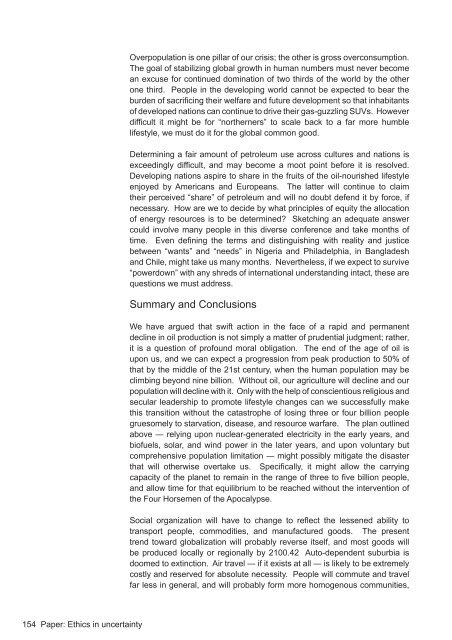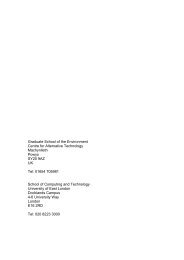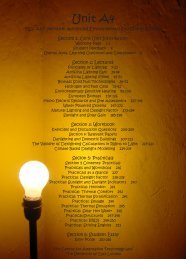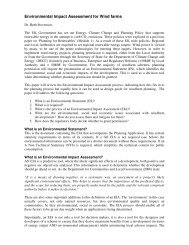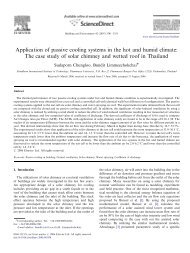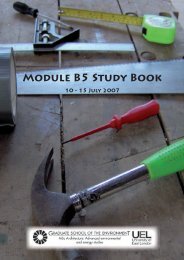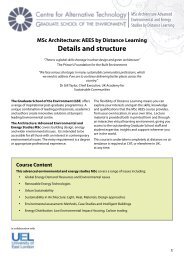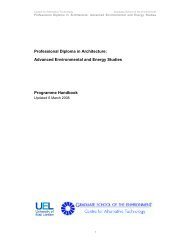Module B1 Study Book - the Graduate School of the Environment
Module B1 Study Book - the Graduate School of the Environment
Module B1 Study Book - the Graduate School of the Environment
You also want an ePaper? Increase the reach of your titles
YUMPU automatically turns print PDFs into web optimized ePapers that Google loves.
Overpopulation is one pillar <strong>of</strong> our crisis; <strong>the</strong> o<strong>the</strong>r is gross overconsumption.<br />
The goal <strong>of</strong> stabilizing global growth in human numbers must never become<br />
an excuse for continued domination <strong>of</strong> two thirds <strong>of</strong> <strong>the</strong> world by <strong>the</strong> o<strong>the</strong>r<br />
one third. People in <strong>the</strong> developing world cannot be expected to bear <strong>the</strong><br />
burden <strong>of</strong> sacrificing <strong>the</strong>ir welfare and future development so that inhabitants<br />
<strong>of</strong> developed nations can continue to drive <strong>the</strong>ir gas-guzzling SUVs. However<br />
difficult it might be for “nor<strong>the</strong>rners” to scale back to a far more humble<br />
lifestyle, we must do it for <strong>the</strong> global common good.<br />
Determining a fair amount <strong>of</strong> petroleum use across cultures and nations is<br />
exceedingly difficult, and may become a moot point before it is resolved.<br />
Developing nations aspire to share in <strong>the</strong> fruits <strong>of</strong> <strong>the</strong> oil-nourished lifestyle<br />
enjoyed by Americans and Europeans. The latter will continue to claim<br />
<strong>the</strong>ir perceived “share” <strong>of</strong> petroleum and will no doubt defend it by force, if<br />
necessary. How are we to decide by what principles <strong>of</strong> equity <strong>the</strong> allocation<br />
<strong>of</strong> energy resources is to be determined? Sketching an adequate answer<br />
could involve many people in this diverse conference and take months <strong>of</strong><br />
time. Even defining <strong>the</strong> terms and distinguishing with reality and justice<br />
between “wants” and “needs” in Nigeria and Philadelphia, in Bangladesh<br />
and Chile, might take us many months. Never<strong>the</strong>less, if we expect to survive<br />
“powerdown” with any shreds <strong>of</strong> international understanding intact, <strong>the</strong>se are<br />
questions we must address.<br />
Summary and Conclusions<br />
We have argued that swift action in <strong>the</strong> face <strong>of</strong> a rapid and permanent<br />
decline in oil production is not simply a matter <strong>of</strong> prudential judgment; ra<strong>the</strong>r,<br />
it is a question <strong>of</strong> pr<strong>of</strong>ound moral obligation. The end <strong>of</strong> <strong>the</strong> age <strong>of</strong> oil is<br />
upon us, and we can expect a progression from peak production to 50% <strong>of</strong><br />
that by <strong>the</strong> middle <strong>of</strong> <strong>the</strong> 21st century, when <strong>the</strong> human population may be<br />
climbing beyond nine billion. Without oil, our agriculture will decline and our<br />
population will decline with it. Only with <strong>the</strong> help <strong>of</strong> conscientious religious and<br />
secular leadership to promote lifestyle changes can we successfully make<br />
this transition without <strong>the</strong> catastrophe <strong>of</strong> losing three or four billion people<br />
gruesomely to starvation, disease, and resource warfare. The plan outlined<br />
above ― relying upon nuclear-generated electricity in <strong>the</strong> early years, and<br />
bi<strong>of</strong>uels, solar, and wind power in <strong>the</strong> later years, and upon voluntary but<br />
comprehensive population limitation ― might possibly mitigate <strong>the</strong> disaster<br />
that will o<strong>the</strong>rwise overtake us. Specifically, it might allow <strong>the</strong> carrying<br />
capacity <strong>of</strong> <strong>the</strong> planet to remain in <strong>the</strong> range <strong>of</strong> three to five billion people,<br />
and allow time for that equilibrium to be reached without <strong>the</strong> intervention <strong>of</strong><br />
<strong>the</strong> Four Horsemen <strong>of</strong> <strong>the</strong> Apocalypse.<br />
Social organization will have to change to reflect <strong>the</strong> lessened ability to<br />
transport people, commodities, and manufactured goods. The present<br />
trend toward globalization will probably reverse itself, and most goods will<br />
be produced locally or regionally by 2100.42 Auto-dependent suburbia is<br />
doomed to extinction. Air travel ― if it exists at all ― is likely to be extremely<br />
costly and reserved for absolute necessity. People will commute and travel<br />
far less in general, and will probably form more homogenous communities,<br />
154 Paper: Ethics in uncertainty


